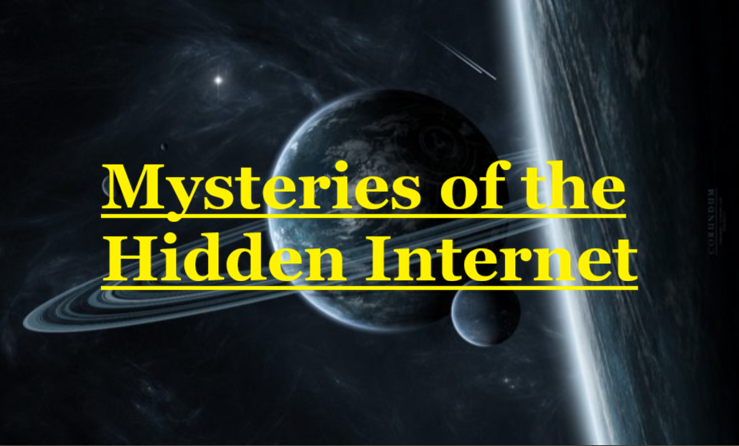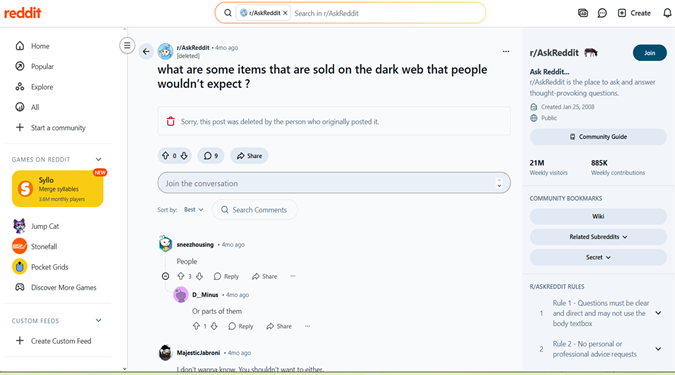The deep web doesn’t just hide secrets — it makes you question everything.
They say the internet has a memory that never fades. But the dark web? It doesn’t even know you exist.
It doesn’t bombard you with ads. It doesn’t inquire about your identity. Instead, it just stares back at you — silent, encrypted, and steeped in an eerie sense of age. It’s like a reflection of humanity, but with the lights turned off.
I can still recall the first time I launched the Tor browser. The familiar glow of my laptop screen transformed into something ghostly in the pitch-black room. I hesitated for a moment before typing in that first .onion link. There was no URL preview. No security certificate. Just a jumble of symbols — almost like a ritual. I hit Enter. For a heartbeat, nothing happened. Then the page appeared. Just like that, I was drawn into the enigma.

The Internet’s Hidden Heart
Most folks think the web is all about YouTube, Instagram, and Google. They couldn’t be more mistaken.
Those are just the storefronts — neat, curated, and organized. But lurking beneath that shiny surface is the deep web — a sprawling digital underworld filled with login screens, private databases, and institutional firewalls.
And then there’s what you’re really after: the dark web.
You don’t stumble upon this place by chance. It doesn’t pop up in your search results. You enter through a digital tunnel — Tor, or “The Onion Router,” an anonymity network that strips away the layers of your location, IP address, and digital fingerprints like peeling an onion.
Here, URLs don’t end in “.com” or “.net.” They end in silence.
For instance, you can find a new Dark Web Directory site that exists both on the clearnet and in silence at torzle.app or torlinks.live.
The Marketplace of Shadows
The dark web doesn’t roll out the welcome mat. It challenges you.
The first thing that struck me was how ordinary some parts looked — simple forums, minimalist chat rooms, and rough design. But the conversations? They were anything but mundane.
One vendor was peddling forged passports and driver’s licenses from three different countries. Another was advertising cloned credit cards — delivered overnight. And then, of course, there were the marketplaces.
You’ve probably heard of Silk Road — the Amazon of the underworld. At its height, it boasted over 100,000 customers, offering everything from weed to weapons, all wrapped in a cloak of anonymity. But that illusion came crashing down in 2013 when the FBI swooped in, shutting it down and arresting its founder, Ross Ulbricht, a 29-year-old who went from idealist to criminal mastermind.
But taking down Silk Road didn’t put an end to anything; it only sparked a new wave. AlphaBay, Dream Market, Hansa — each one more sophisticated than the last, rising from the ashes of its predecessor. They’re like crime syndicates, but instead of guns, they wield code.
Red Rooms, Ghosts, and the Line Between Fact and Fear
There’s a chilling myth out there — they call it a Red Room. A live stream where someone is tortured or killed, and viewers pay in cryptocurrency to watch or even influence the outcome.
Is it just an urban legend? Probably. But that thought sticks in your mind like a thorn.
- Law enforcement insists they’ve never found any real proof.
- Cybercrime experts argue that streaming one undetected would be nearly impossible.
But fear doesn’t need proof; it thrives on the mere possibility. And the dark web is brimming with just that — things that could exist.
It’s the uncertainty that makes it so alluring.
Not All Monsters Are Criminals
Despite its notorious reputation, not everything on the dark web is sinister.
There are journalists using Tor to escape censorship. Activists working in oppressive regimes where speaking the truth can lead to death. Whistleblowers leaking information through SecureDrop, putting everything on the line.
For them, the dark web isn’t a lair of criminals; it’s a final refuge — a borderless underground railroad for information.
But for every brave act, there’s a room peddling stolen identities. A chat log detailing the trade of human lives. A deserted forum filled with scripts for ransomware, viruses, and deceit.
Here, good and evil don’t wear badges; they wear masks.
The Cost of Looking
Most people wisely choose not to venture into this territory.
The dark web doesn’t kill you with what you discover — it kills you with what finds you.
If you click the wrong link, you could invite malware that spies on your camera. Say the wrong thing in a forum, and you might set off surveillance. Make a questionable purchase, and you could find yourself on a list that’s not supposed to exist.
Governments, journalists, researchers, and even predators all lurk here. It’s like stepping into a cave filled with whispers — you never really know who’s listening.
Final Layer: The Mystery Remains
So, what exactly is the dark web?
- A hidden digital realm?
- A reflection of humanity?
- A myth fueled by fear and intrigue?
Perhaps it’s all of those things. It’s not the dark web itself that’s sinister — it’s the intentions people bring with them. The same anonymity that protects a whistleblower can also hide a criminal. The same currency that buys freedom can also purchase fentanyl.
The dark web stays shrouded in mystery not because it’s impossible to understand, but because it mirrors our own complexities.
You don’t enter the dark web seeking answers.
You go in search of the questions that no one dares to ask.
Cyber Security Report 2025: Key Insights from Dark Web Activity
The launch of The Cyber Security Report 2025 marks a crucial step in addressing the year’s most pressing cyber threats and trends. Privacy communities are actively discussing:
- The destructive impact of cyber warfare on individuals and organizations
- The evolving strategies and tactics of ransomware groups
- The growing prevalence of dark web information theft
- The increasing targeting of edge devices and IoT networks
Based on real-world data and analysis, dark web users in 2025—particularly those sharing experiences on platforms like Reddit and Quora—have reported encountering strange and unsettling content in hidden forums and marketplaces. These observations often highlight a mix of criminal activity alongside bizarre or alarming discoveries, offering unique insights into the evolving underground digital landscape.

Frequently Asked Questions About Unusual Dark Web Content
Exploring the dark web often leads to encounters with strange questions and content. Here are some common examples:
Q: What bizarre items have been listed for sale on the dark web?
A: Users report seeing highly unusual items, such as puppies, a used DIY vasectomy kit, and even human skulls. These listings often raise questions about their origin, legality, and safety.
What are the hidden parts of the internet?
The Deep Web: The Deep Web consists of parts of the World Wide Web not discoverable by standard search engines. This includes password-protected content, dynamic pages generated in real-time, and encrypted networks. These areas are often used for secure business operations, private communications, or restricted academic resources.
Q: Are there disturbing guides or tutorials on the dark web?
A: Yes, some guides cover unsettling topics like the contents of the "anarchist cookbook" or extreme instructions. These materials are highly controversial and often illegal.
Can I go to jail for using the dark web?
Visiting the dark web itself is generally not illegal. Simply browsing without participating in illicit activities does not usually lead to arrest. Legal risks arise only if someone engages in activities like purchasing illegal goods, hacking, or sharing prohibited content.
Q: What are “mystery boxes” on the dark web?
A: Mystery boxes are items sold without disclosing their contents. Buyers have no way of knowing what they will receive, making them inherently risky.
Can I be tracked if I use the Tor browser?
Using Tor helps hide your real IP address and anonymizes your online activity. For extra protection, pairing Tor with a VPN encrypts your internet connection, keeping your activities private and significantly reducing the chances of being tracked.
Q: Are there legitimate discussions on the dark web?
A: Some forums feature philosophical, scientific, or niche discussions, including complex math, science debates, and even alien cult topics, benefiting from the anonymity the dark web provides.
What is actually on the dark web?
The dark web hosts a mix of illegal marketplaces (drugs, weapons, stolen data, malware), hacking services, and illicit content. It also serves legitimate purposes, like secure communication for whistleblowers, activists evading censorship, and accessing restricted academic resources. Most dark web sites use .onion domains and require specialized browsers like Tor.
Q: What unusual personal services are offered?
A: Certain forums list strange services, such as hiring someone for surveillance or highly specific personal tasks, which are often illegal and risky.
What is the darkest part of the web and how do you access it?
The dark web is a non-indexed part of the internet that hosts hidden sites accessible only via overlay networks and anonymizing browsers like Tor. Tor encrypts and routes traffic through multiple nodes, keeping users' identities hidden while accessing these private networks.
Q: Can ordinary questions appear on dark web forums?
A: Occasionally, mundane questions are found, like how to check if an email has been compromised. These feel out of place but highlight the mystery nature of dark web content.
Is Tor 100% untraceable?
No, Tor is not perfectly untraceable. While it enhances privacy by routing traffic through multiple encrypted relays, vulnerabilities exist—such as compromised entry/exit nodes, user mistakes, and traffic analysis by sophisticated attackers. Following best practices is essential for maintaining anonymity.
What is “Virus Soup” on the internet?
According to fringe internet lore, The Fog (or “Virus Soup”) is a chaotic, hidden layer of the network beyond even the Deep Web. It is described as a battleground of hostile code, where every node may contain threats, representing the most anarchic and unpredictable part of the digital world.
Would you be brave enough to peer into the dark? Or are you worried about what might be staring back at you?
Read more on hidden internt and its mysteries by visiting Torzle App